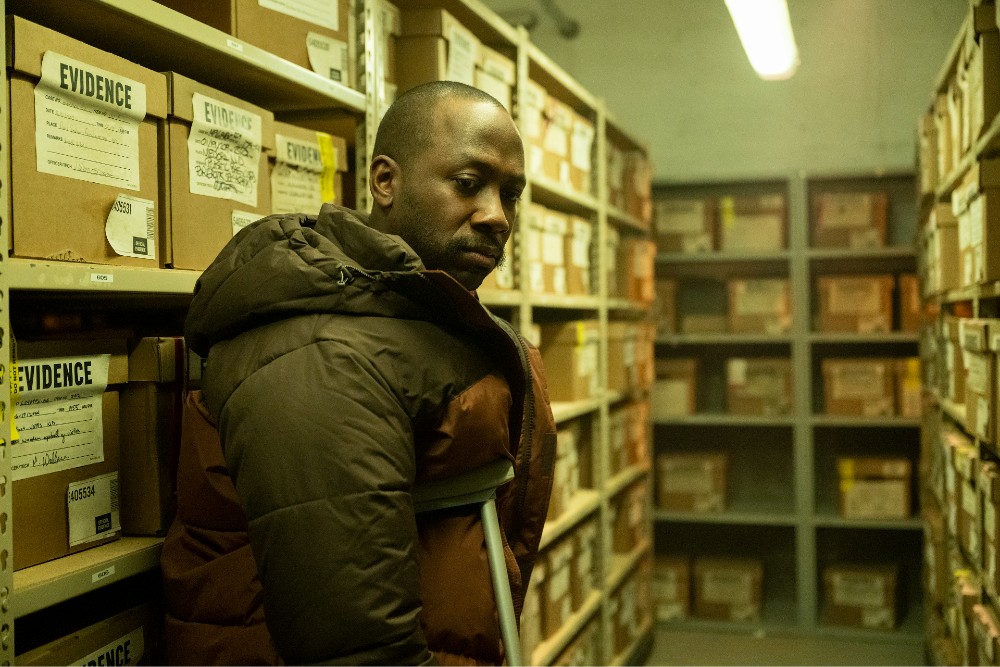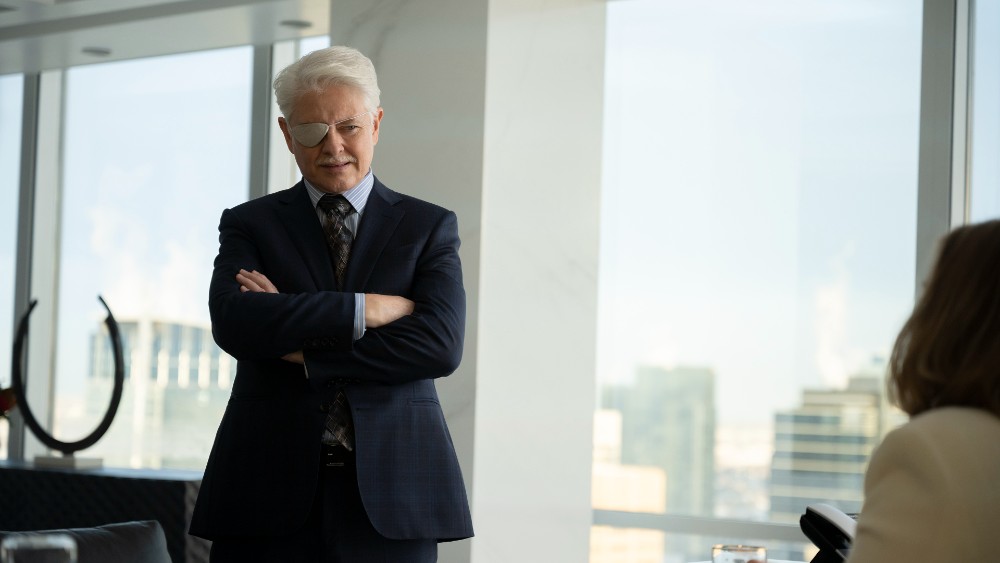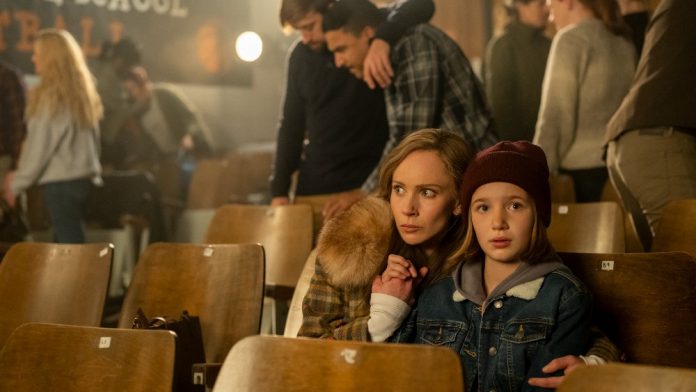There was considerable doubt nearly a decade ago when FX adapted the Oscar-winning Coen Brothers film Fargo for television. Now, as the show’s fifth season is in full force, led by new cast members Juno Temple, Jennifer Jason Leigh, and Jon Hamm, it’s clear that the offbeat anthology has been a resounding success.
Above the Line had the chance to speak with Dana Gonzales, who began his career as a cinematographer, earning an Emmy nomination for every season so far of Fargo (with a win for Season Two). Recently, he’s transitioned into directing and producing as well, and he’s been collaborating for a long time with series creator Noah Hawley on the FX series, Legion, another highlight of their work together.
Gonzales broke down his approach to his craft, given his unusual expertise in certain technical elements of the television-making process, and also showcased the difference between working on something where he’s a critical part of the overall creative vision as compared with showing up to direct an episode of The Handmaid’s Tale or The Changeling. He even dropped a few hints about his upcoming Alien TV series with Hawley.

Above The Line: Before we get to Fargo, I have to compliment the look of Legion. It’s such a terrific visual experience.
Dana Gonzales: Thank you. It’s right up the alley of this conversation, working with Noah. It’s what we do. Fargo and Legion are very similar in some respects, because it’s world-building and we do it on a season-by-season basis. Every season of Fargo is a different story, a different look. Legion, every season was in a different location, a different place, a different world, and had a bit of a different look as well. Somehow, we can’t escape that. Everything we do is world-building. It’s good. It’s something that both of us like to do.
ATL: Aside from those aliens we might have seen in Season Two, Fargo is not a science-fiction show, whereas Legion is so heavy on that. To hear them described as so similar is very interesting.
Gonzales: Well, when we did Season Three of Fargo, we had just finished the first season of Legion. Some of the filmmaking that we did in Legion, we brought over to Fargo. We just couldn’t help ourselves. Number one, we had two Ewan McGregors, so we had to do a lot of motion control, which we did in in Legion. There were some good pluses, but, if anything, we had to tame ourselves, because Legion so bombastic, and Fargo, there’s a bit of a bible. We try not to move the camera just to move the camera. Legion, we never thought about in that respect. They just are similar in some respects, our aesthetics of what we like and what we don’t like. That always happens on every project we do.
ATL: What’s your relationship with the original Fargo movie?
Gonzales: I, of course, saw it like everybody else when it came out and never thought I would have a chance to work in that space. Season One, when I received the scripts and read them, they were just amazing. I’m sure I had read some scripts up to that point that were homages to different projects, but when I read Fargo Season One, I knew this nailed it. I knew it was a hit. But when we were making Season One, it was like taking on the Holy Grail. People were like, don’t do it. You know, they tried it! They made it about ten years prior, a pilot, and it didn’t work. So it was still that no one knew we would make it, and we thought people were just going to be like, get out of here, what are you doing? And here we are, five seasons later, still making it, and there probably will be a Season Six.
ATL: Season Five feels, even more than Season One, like a throwback to the movie. Is there an effort for each season to be radically different or to tie it all back to this mythology of this fake true story?
Gonzales: For sure, every season, we have our homages, and we celebrate those. I think the audience appreciates those. If we had avoided that in Season One, I think that would have been an issue. That basically bound Season One to the show, and then people were like, okay, I’m in. I feel like this is what it’s supposed to be. Season Five has some strong homages in the first episodes specifically, and, again, I think everybody celebrates those. So do we. We hold them high and we respect them. If anything, by Season Five, we’ve taken some license with the show. Season Four, we probably took a little more license because the story was a little bigger and broader and not Minnesota nice so much. Every crew member and head of department and everything, they study this stuff and they know it. They know it from the back of their hand. There are all kinds of different Easter eggs that sometimes don’t transcend in the edit, but we start with these Easter eggs all the time. Sometimes it doesn’t make perfect sense, but in the Coen spirit, it makes a lot of sense. I read some reviews where people are like, maybe you don’t need so much of that anymore, but I think you do. I think the general audience enjoys that.
ATL: It’s helpful to tie it together, because it’s an anthology series that could lose audiences each season. You still go back to that same root enthusiasm and mood.
Gonzales: Well, now we have Easter eggs of past episodes on their own, so they’re not even from any one Coen movie. We still have homages to A Serious Man, to No Country for Old Men, to Barton Fink. They’re constantly there, so it’s not just Fargo. It’s the whole world of it, so if you’re a fan of the Coen Brothers, you really get excited about it.

ATL: I’m curious about your career path. You’re still a cinematographer and now a director for the show, and you go back and forth. But you don’t direct the episodes that you shoot, right?
Gonzales: No, I won’t do that. I’ve done that before, not on Fargo. I always hire a DP. It’s just too much work, and I enjoy working with other great cinematographers. They always bring the best out of me. Because I’ve been part of the show for so long, I really understand. The drama and the humor happen sometimes in one to two cuts. There’s a joke, someone gets killed, there’s a joke. That’s really challenging. That’s not for everybody. You have comedic directors, you have dramatic directors. It’s easy on Fargo to go all dramatic, and it’s easy to go too comedic. It’s always about finding that line of that. My knowledge of the show and my relationship with Noah is crucial. I probably talk to Noah more than any one person about what works and what doesn’t work. I’m there from preproduction to the very last postproduction. I just finished working on Season Five a week ago. You just know what works and what doesn’t work and how to approach it. For me, I started directing on Season Four, and it was a very natural thing. I had already directed other projects before that, but Fargo I started directing on Season Four. This year, I produced as well on Season Five, which was another just needed thing. I already did a bit of that as it is, but now I was able to be in the room a little earlier and have a voice a little earlier that could help tell the story or to fix the logistical challenges or whatever it is.
ATL: Is it easy to balance all those roles, and is there anything that you’re more comfortable with compared to something else?
Gonzales: I’m getting out of shooting more. We’re doing Alien right now. I’m executive producer, director, and I’m shooting the first episode. The first episode is so big that I can only shoot one episode. That was such a big challenge, and again, with my relationship with Noah, it made sense because we have a shorthand. That particular thing had so much preproduction and so many technical things that it just helps the show with its singularity of creative thought. Noah and I are a little more connected that way. I don’t know when I’ll give up shooting. I can see myself shooting Fargo Season Six if that happens, just because it’s a lot easier for us to set up and have our shorthand. Get it started and have what we want and then let everything take over. I enjoy the directing the most, but I enjoy the producing just because I do take a lot of pride in the show.
It’s my show, it always has been. I want to be able to help the other directors that come in and the other DPS that come in. I want to be able to keep it on the course. I want to be able to be the shorthand that helps them work with the other line producers so we can look at the singular goal of making this great show. I think Season Five has a lot of that, because you just have more people talking about the passion of it and getting the story on screen. When you’re an episodic director, you’re coming in to do your episode and then you’re leaving and you’re trying to catch up, of course. The more I can help those people the better. I’m enjoying it. It’s hard to do all of it, and I enjoy the directing the most, just because I’ve always, especially when I shot Fargo, had this strong idea of what this episode is or what this scene is or whatever. Now I’m just able to get that in the can easier.
ATL: Do you find that you get notes when you’re shooting from a director that influence how you then direct other DPs?
Gonzales: I don’t know. I’ve never been asked that question. I feel like it’s been such a long time and I’ve only directed and or only shot for a director and that was it, so it’s hard for me to remember that. If anything, I know people are weary of working for a past cinematographer, thinking they’re going to get in their rice bowl. I don’t. I hire really great cinematographers, and I enjoy what they do. But, yeah, I probably am becoming my dad, when you say something and you’re like, oh, I just became my dad. I’m sure there’s a little bit of that. Directing is different. The visuals will always be important to me just because I’m a visualist, but, suddenly you’re like, I’ve got to get this done because I need this or we’re not going to have the story. That suddenly becomes more important than the photography. When you’re a DP, you’re pushing for the photography. So, yeah, I’m sure some of that comes across.
ATL: Because you’re so involved in so many levels of the show, do you get first pick at which episodes you want to direct?
Gonzales: Normally, it happens a lot to do with the scheduling. If I’m going to do the first block, one and two, of Fargo, then I do five and six, so I can go right into prepping it and. Five and six are always kind of juicy, in the middle of the season. It starts off that way, and Season Four, I did four episodes. But I took over because COVID happened, so I ended up directing one more episode. It really comes down to schedule and normally, if I shoot it, I will always do the third block first, and then maybe do the last episode or something like that. That’s what I’m doing on Alien. I’m doing four episodes there as well, so it’s just a scheduling thing.

ATL: How does it feel to step into something else like The Handmaid’s Tale, which has such an established mythology that you’re not involved in so thoroughly?
Gonzales: Season Five has a cast that’s just stellar, that really owns what they do. The good
thing about Handmaid’s Tale, I know two of the top producers there. I know some of the people there, some of the crew. They really brought me in and they all knew who I was. There was a strong acceptance there that was great. But, yeah, you’re working into actors that have just proven themselves and know the story better than anybody. It was a challenge. I’m working with a cinematographer that I didn’t hire, so I’m literally walking into the classic episodic situation and having to adjust myself to them. I like that. I was a fan of the show, and obviously they have super high goals. It was a very friendly environment. I enjoy working with actors at that caliber, of that level. You have Lizzie Moss, who just owns the show. She’s an executive producer of the show, and she really watches over the whole place. It’s just an amazing force. It was a really great experience for me, to step into that and come out of it, in a pretty good way, that’s a good lesson. It’s not the most comfortable thing, like Fargo, but, look, I like not to be comfortable with anything. I think Noah’s the same way. We just push ourselves, so it’s not like we’re exactly comfortable in our own home.
ATL: You also directed an episode of The Changeling this year, which is something again totally different and in its first season.
Gonzales: Yeah, I love first seasons. I love the unpredictability of the first season. Everybody is scared and they don’t know what works. It’s not like a Season Five of Fargo or of Handmaid’s Tale, where they know what works and doesn’t work, and they know how actors interchange with things. Season One of any show – and I did Episode Four, so they still didn’t have a strong pilot cut – they’re still trying to figure it all out. So that was even more staying on the page. That show was very dense in the script, just how many things were happening and you still have x amount of days to shoot it. How is that story going to come across? My episode, we go to the island, and before that they were all in New York City, so it’s already like a new world they’re going into and a new pace and everything about it.
Luckily, I felt very at ease there. There was just great producing. I’m very fortunate in a way that a lot of people know me as a cinematographer, know who I am, so when I walk into a situation, when I meet with people, even on Zoom, they know what I’ve done. It’s not like no one’s ever heard of me. I’m proven. A lot of the crew knows who I am, good or bad. Oh, it’s a cinematographer coming in as a director, but I think I get them at ease. And then I think a show like that, my strength visually and even my producing strength helps them because I’m just able to think that way. I’m not just like, I don’t know, that’s your problem. I know that their problems are my problems. I want to effectively, for my episode to be good, get the story points across. I need to get as much scope as I can, I need to not do crazy hours. All these things have to happen. All the disciplines that I do really help in those situations, even though they’re not the shows that like Fargo, where I’m so invested in.
ATL: You’ve mentioned the upcoming Alien project a few times. That’s a pretty big franchise with considerable expectations. What should fans be prepared to see?
Gonzales: We’re honoring the franchise. We’re not saying, oh, we’re going to retool this. We’re not trying to do that. Alien the movie is a two-hour movie. We’re doing eight hours of storytelling. We’re not remaking the movie. It’s another part of the story, and we’re honoring it. Like we did with Fargo, we honored it. We’re doing it again. Alien has a lot of different movies in the franchise. Some are better than others, and so we’re taking from them all. It’s really more focused on Alien and Aliens. We’re trying to honor it. Obviously, the franchise keeps going, and the fans want to see more, and we want to give them more. Getting the xenomorph right and all those things, those are important. So we’re not afraid of it, but, like I said, we honor it, and hopefully by honoring it, the fans will love it.
Season 5 of Fargo airs on Tuesday nights on FX and is also streaming on Hulu. You can also read interviews with series stars Jon Hamm and Juno Temple and Jennifer Jason Leigh.



